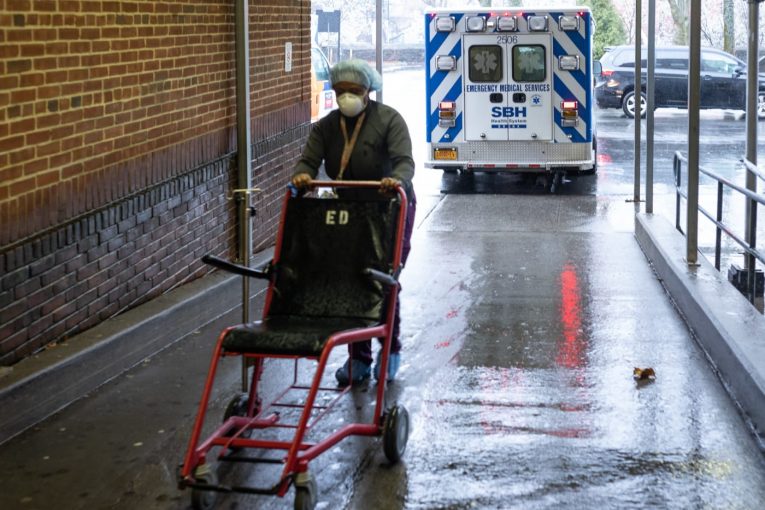
 by Dov Salkoff
by Dov Salkoff
A while ago I spoke to a UC Davis student who had two jobs and an additional source of income from selling nudes online. Despite that, the student still struggled to pay the bills. Other Yolo residents I spoke with while canvassing for Bernie said they were one paycheck away from becoming homeless. This was before coronavirus, when even then, 40% of Americans could not afford a $400 surprise expense ( REF ). Now of course, the situation is much worse. Almost 1/3 of Americans didn’t pay this month’s rent ( REF ).
The COVID-19 pandemic tragically reminds us that the workers who are in the most precarious situations are also the workers who hold our society together: grocery store clerks, bus drivers, people taking care of the sick and elderly. This awareness has spurred a community-wide expression of appreciation for front-line workers and efforts to give immediate relief to those in need. Networks like the Covid-19 Yolo Community Response Facebook Page have suddenly burgeoned, promoting resources like the Yolo Food Bank and distributing hand-made masks. These efforts have been heartening:  during times of need community members will work together to help one another.
during times of need community members will work together to help one another.
Along with this appreciation for front-line workers comes the assertion that they are heroes. While characterizing them as heroes is deserved under this crisis, does it accurately recognize their situation for what it really is? Many workers literally have no other choice: they must work or face utility shut off, default on student loans, cancellation of their health insurance, or eviction. It’s also clear their employers do not value them as heroes. Many workers lack hazard pay and employers (e.g. Grocery Outlet, Center for Autism and Related Disorders) have not provided their workers with basic personal protective equipment. Perhaps then, we might more accurately characterize workers as hostages.
The hostage condition is not specific to the COVID-19 pandemic. Even before, workers were bound to their employers by the need for healthcare or the fear that they wouldn’t be able to find another job. Food banks, support networks, and a temporary moratorium on evictions have eased immediate economic burdens for some, but these measures do not address large, systemic problems like privatized healthcare. Local communities (composed mainly of working and middle-class people) cannot cover the cost of $20k for every patient hospitalized by COVID-19 ( REF ).
Another long-term problem is stagnant wages. For decades, working-class wages increased alongside productivity in the U.S. Since 1973, however, hourly compensation rose a mere 12%
while productivity increased 73%.

Source: Adapted from EPI analysis of Bureau of Labor Statistics and Bureau of Economic Analysis data. This uncoupling of productivity and hourly compensation has been attributed to a decline in union membership and labor rights. In the 1950s, almost one third of labor was unionized. Now, membership is at 10.3%, with only 6.2% of the private sector belonging to a union ( REF ). Court decisions like Janus v. AFSCME further erode union power. Without the ability to collectively bargain for higher wages, employers are free to take a greater share of the profit generated by
their workers.
To support struggling workers we not only need to think about immediate gain, we need to work for sustainable, structural change. Mutual aid helps workers immediately. For long-term impact, we should work to shift power away from employers so workers themselves are able to improve their working conditions. We have a clear way to do that.
The Democratic Socialists of America and the United Electrical, Radio and Machine Workers of America have teamed up to create an Emergency Workplace Organizing initiative. Any worker who wants help organizing their workplace can sign-up at tinyurl.com/COVIDorganizing .
They will be contacted by trained organizers who can help them start a petition, connect with other workers, and get the workplace demands they need during this crisis. You (yes you!) can help by sending the form URL to anyone interested in organizing their workplace – especially front-line workers. The URL can also be distributed via flyers with a brief description.
We can fight for working-class demands outside the workplace too. In order to help the millions of Americans struggling to pay medical bills during this crisis, we can urge congresspeople to support the Health Care Emergency Guarantee Act.
This bill, introduced by Bernie Sanders in the Senate and Pramilla Jayapal in the House, would expand Medicare to cover all uninsured individuals and all out-of-pocket health care costs for currently insured individuals for the duration of the pandemic. You can read more about the bill here .
It is critical that we contact our senators and Rep. John Garamendi now to ensure that the next COVID-19 relief package includes this expansion of coverage.
History has shown that the most meaningful societal changes occur when thousands or even millions of people act collectively. Although past efforts in Davis have relied on relatively small advocacy groups, the large turnout for the Youth Climate Strike and a high favorability of Bernie Sanders in Yolo County (38% of the vote overall, 80% on UCD campus), suggest a growing
realization of collective power.
I am a member of the newly-formed Yolo chapter of the Democratic Socialists of America. We are working to identify widely-felt issues and bring “non-activists” into the movement. To help us build a local campaign, we are drawing on lessons from the labor movement and past political struggles.
We will only see transformational change when everyday people assert their collective power. You can get involved by going to tinyurl.com/yolodsasubscribe . We welcome all community
members.
Dov Salkoff is a community organizer who has attended multiple activist and labor trainings. He has a PhD in neuroscience and has lived in Davis/Woodland for a year and a half.
